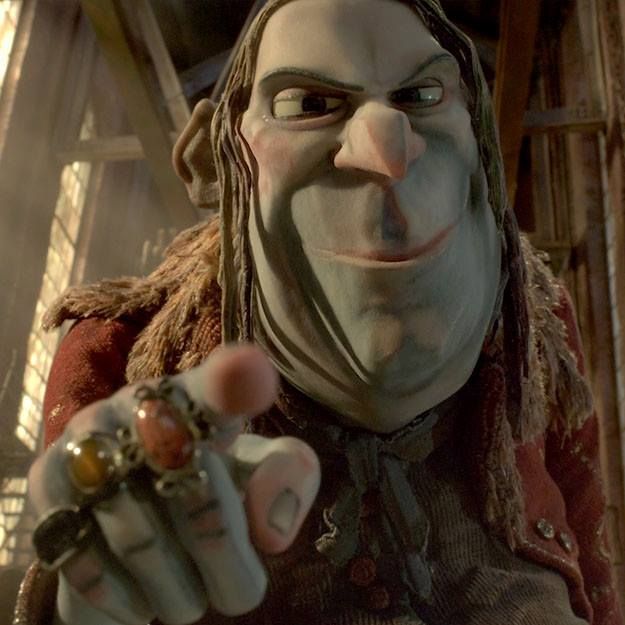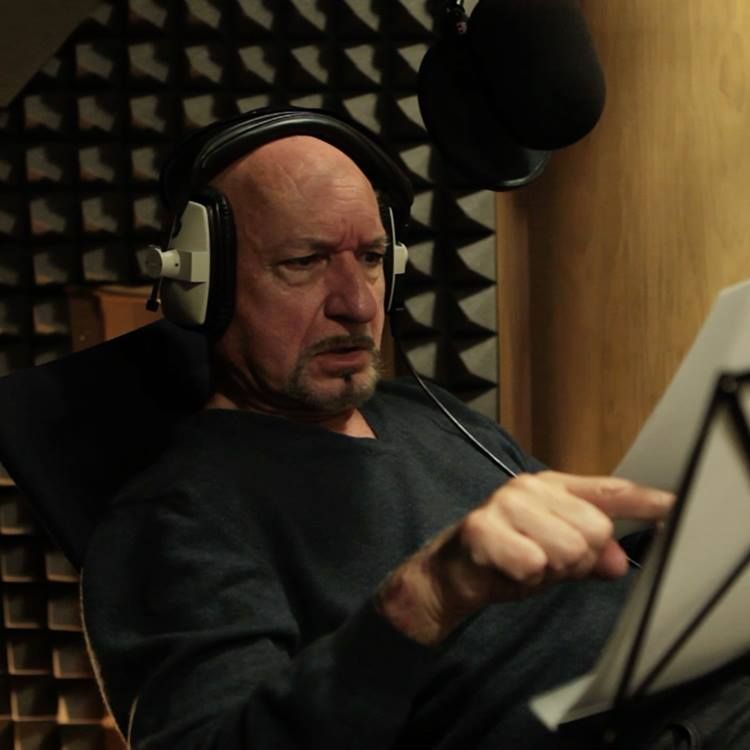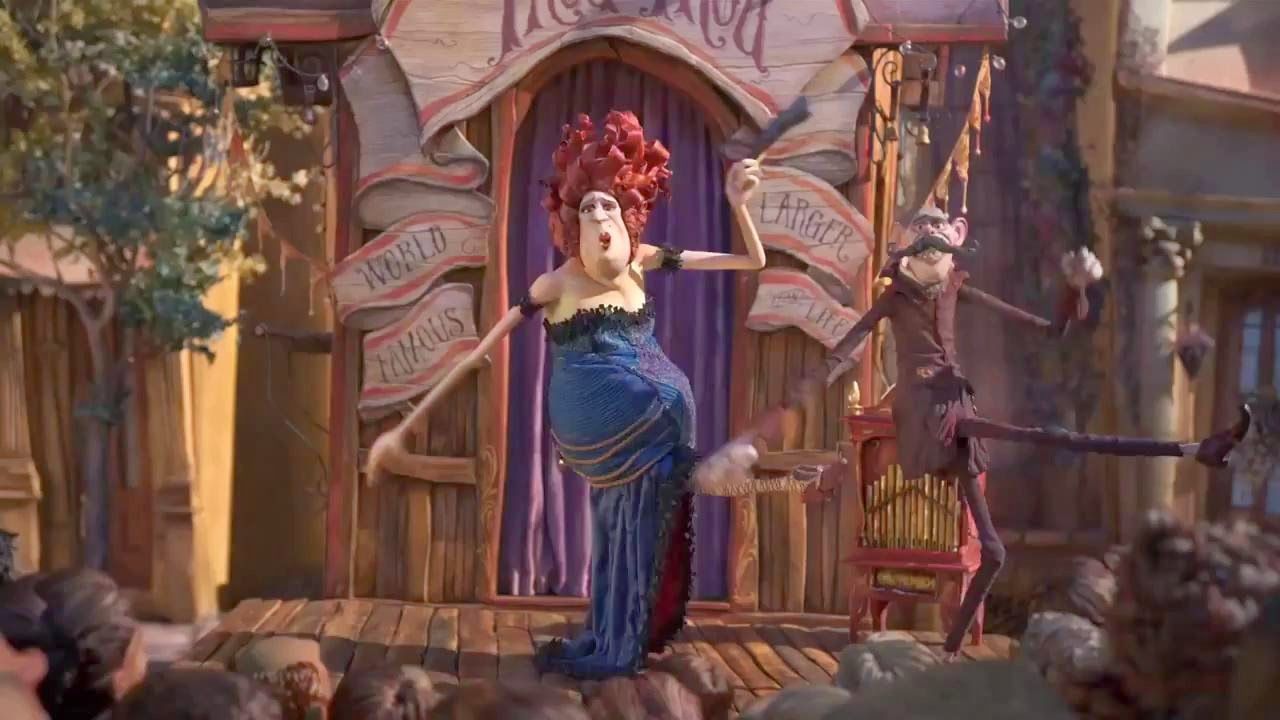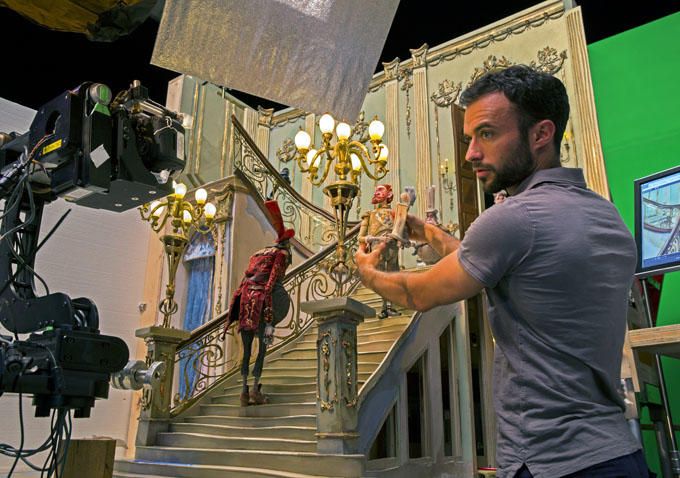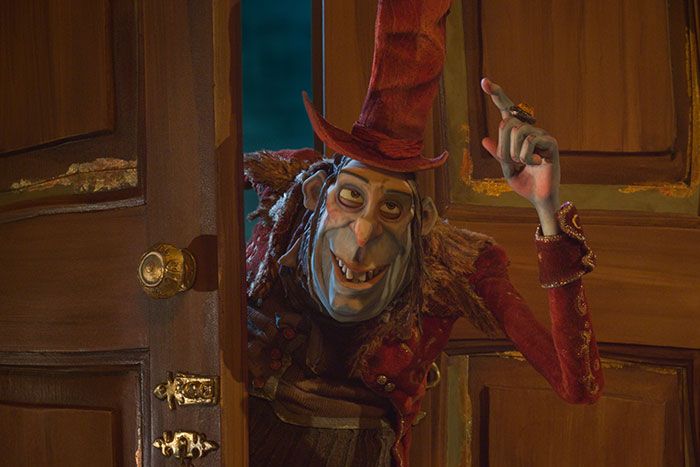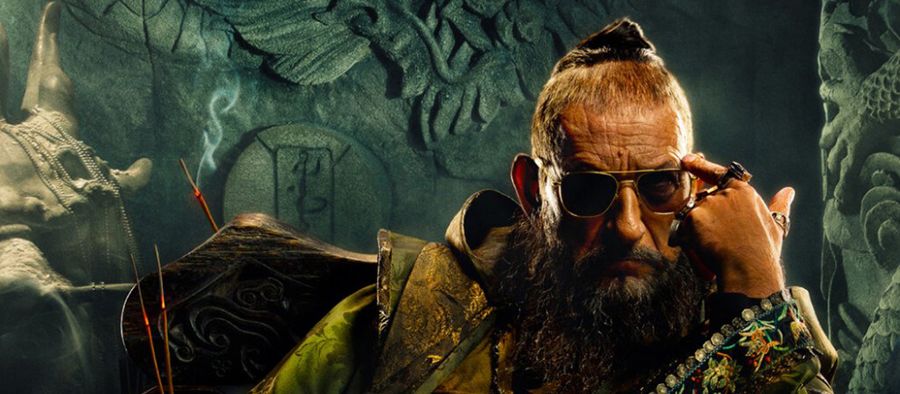Despite a mantle packed with awards, including an Oscar, and a knighthood honoring his artistic contributions, Ben Kingsley doesn’t consider himself a “serious actor.” In fact, he contends, there’s no such thing.
Kingsley is long known for his incredible range in such roles as the Indian leader in Gandhi, the shrewd mob boss Meyer Lanky in Bugsy, German accountant Itzhak Stern in Schindler’s List and charismatic but brutal British gangster Don Logan in Sexy Beast. But lately he’s been on a tear with more fun-loving and fantastical portrayals – among them, the faux-villain the Mandarin in Iron Man 3 and Marvel One-Shot: All Hail the King, and the intimidating Mazer Rackham in Ender’s Game.
In The Boxtrolls, the new 3D stop-motion animated film from Laika (Coraline, ParaNorman), Kingsley delivers a bravura – and almost unrecognizable – vocal performance as Archibald Snatcher, the baroque and grandiose exterminator who targets the underground creatures raising an orphaned boy (Isaac Hempstead-Wright of Game of Thrones).
As the actor revealed during a roundtable conversation with the press, he managed to realize the delightful and dizzying character all while literally laying down on the job.
Ben Kingsley: My publicist was in the room just before you chaps came in and she was remarking on [the Boxtroll puppets on display]. She said “Oh my goodness – they really are wearing clothes!” And they are – that’s not plastic, that’s fabric. Every single article of clothing on our models was handmade, hand-stitched, and the camera loves and captures all of this detail. If they’d made any shortcuts, the audience would not be as hypnotized as they are, truly, by this film. I say “the audience” – I’ve seen it with one other person in the cinema, my agent, but we were speechless afterwards, and I do gather there’s a growing consensus from everyone I’ve spoken to that this is a really great movie. It’s totally captured people – they love it. It’s the detail!
How much insight into the process did you get while the movie was being made?
I did get a glimpse. I didn’t go to the animation studio because I recorded in the United Kingdom, and the studio as you know is in America. But they did send over a small clip that they’d animated of a speech I gave in the film, which I recorded fairly early on in the process, and as you can hear from my Archibald Snatcher, I played with vowel sounds and I put the letter “H” in words were there isn’t one, and I really wanted to push the envelope of the ambition and neediness in his voice. And the particular speech was about ambition, how he describes that lesser creatures – like the Boxtrolls, who he considers lesser creatures – have a limited imagination and ambition, and great men like himself have a higher degree of ambition. It’s a fascist speech, basically – it’s a horrible speech if you analyze it politically, but it’s said in this grandiose manner that I use and he sort of, with his henchmen, gets away with it. And I saw the sequence, and he’s walking down a flight of stairs and there’s a little phrase I used with the speech and they accompany it with this extraordinarily flamboyant hand gesture where Snatcher scrapes back a few strands of hair and continues down the stairs. And I thought, “Yeah, everything that I’m doing with my voice they’re taking and they’re using,” so it was very exciting.
How did you construct Snatcher’s voice? Where you channeling anyone, or any character?
When you see the model you see that he has an enormous pot belly and that accentuated physically the fact that he is kind of parasitical, hungry, greedy, grabbing, snatching. And I wanted the voice to come from that almost-echoing emptiness inside him, his distended belly. There are a lot of London people that I work with in the film business who work in the studios, and they have very strong, pronounced London accents, so that was never difficult for me, to hit the London accent. But to have the voice come from a different part of me and to sound as if it’s coming from him – at first I tried recording standing up, and I found that I was moving far too much and that my voice was coming from where it should come for me. Then I tried sitting down. And then I tried lying down – there he was! So within a few minutes of arriving at the studio, a studio with which I am very well acquainted, they said “Sure!” and they rigged up this amazing seat and footrest and got the microphone there and got the script there. And then I refused to move. I kept saying to myself, “Don’t make any gestures while you’re talking, because if you do you’re compensating for something that’s not in your voice. It has to come from the voice.” So I was basically horizontal and not moving and let it all come from me to the microphone.
How did you find Snatcher’s alter ego, Madame Frou Frou?
[In Frou Frou’s high-pitched, French-accented voice] It just came out of my mouth! Just playing around.
Did you have to keep yourself prone and still to get to her too?
I did – no gestures at all. I did not wear a wig, I did not wear a corset while I was recording Madame Frou Frou.
Did you do anything special for his cheese-eating voice?
Yeah, I did. With my two hands, very simple: I just squashed my face in so my mouth was as small as possible and squeezed the words out through my mouth.
Did you find a Falstaffian quality in Snatcher?
Well, he’s a raconteur, he’s grandiose and he doesn’t, unfortunately, have a relationship the way that Falstaff does with Prince Hal. But at the same time, when Falstaff at the end of, I think, Henry IV, Part 2, says to his colleagues, “I will be sent for,” as one of Falstaff’s last words in that play – tragic, heartbreaking. And it’s a great analogy, actually, and Archibald Snatcher’s great cri de couer is “I will be sent for.” And he’s not sent for. They won’t let him join the club. The only way he can get himself needed is to say, “I know where the enemy is and I know they’re a threat to you, and I, as a great favor to you and as a good citizen, will destroy the enemy.” But they’re not the enemy. They’re beautiful, creative people who live underground and don’t harm anybody, but he’s demonized them so successfully that he’s terrorized the whole of the population. It’s a fear-based trick, and he nearly wins. It’s a political trick, demonizing somebody.
Dickens was probably in mind more than Shakespeare here.
Dickens came from the script immediately, because as soon as you read the protagonists you see that they all have rather dynamic names, and Snatcher is a name rather like the Artful Dodger in Oliver Twist. There’s a lot of Oliver Twist in this – well, that’s unfair on the writers because it’s a completely original piece. What I’m saying is that I can see echoes of great myths and stories that involve the plight of the orphan adopted by another tribe, and then trying to reconcile those two worlds. Moses is a great example; Oliver Twist is another great example; and Mowgli in The Jungle Book is another great example. Animals in the jungle bring him up – wolves, actually, bring him up. And here, this lovely little angel, the baby, is brought up by Boxtrolls. So there’s something eternal in the script, and I love that, that I can find that.
How did you get involved with the project?
Very simply: They sent me the script, which was great. I think the debate of how I got involved is really a question for them [the filmmakers] because first they debated whether or not they should even bother to send it to me because they were convinced I’d say no – which is unfair because of course I’m not a “serious actor.” There’s no such thing! It’s a contradiction in terms! I just said yes straightaway. It’s a beautiful script. What you see on the screen is all on the page, and it’s absolutely beautiful.
How often have you done animation?
Very infrequently. And since then I’m now Bagheera in The Jungle Book and I’m also Dragon in Dragonheart 3, so another door’s opened. Absolutely, yeah. And it’s great because actors can now diversify. There are all sorts of things we can do that a few years ago weren’t even existing.
Why do you think things changed and this opportunity appeared?
Well, I think there’s an appetite among audiences for superb animation, for example, and where Laika is concerned and this company is concerned, is that in Coraline and very much so in this, the audience somehow subliminally can feel and tell that this is made by the human hand. You’re not for a second detached from the human craft of making something. And for better or for worse, something that is generated by a computer will not have the same resonance and feel and connection with an audience – I don’t think so, in my modest opinion. I think the secret to this film is that it’s made by hand. I think the closing sequence after the credits is awesome: how they go into that philosophical debate at the end of the credits and then show how each creature is made by almost some deity whose hands come down and shape our lives. An extraordinary philosophical debate. And those two guys, they have the debate throughout the film: “Are we the goodies in this film, or are we the baddies in this film?” It’s almost a Shakespearean device wherein Shakespeare the actor steps out of the play, talks to the audience and then steps back into the play. And that’s what these guys, in a sense, are doing.
Did you improvise at all in your characterization?
I have to say that I did not improvise. Everything I say is on the page. I think the only improvisation is with my vowel sounds. I pronounced words differently, but every word I say is on the page. I try to elevate my voice to pretend I’m from a different class, but it’s all on the page. I did not improvise any dialogue. I improvised sounds. And the director, when I made these noises with my voice and vowel sounds, he popped into the recording booth and said, “The animators are going to love that! When you do that, they’re gonna love it!” So then I though I was separated from the animators by thousands of miles and time, I had a connection with them. I knew, thanks to Tony [Stacchi], what sounds would help their physical manifestation of Archibald.
What was your reaction to the physical performances the animators matched to the voice work?
I think that the body language of each puppet is absolutely appropriate to that character and that character’s journey. So the strange, affected walk that Snatcher has and the way he preens himself like a peacock, and Winnie’s body language, the girl’s and the boy’s – our young hero and heroine – and Lord Portley-Rind – all of them have body language that I think is totally appropriate to the character. Perfect.
Has there ever been a club that you’ve strived and struggled to get into that’s taken a while, as it did for Snatcher?
No, because my ambitions are limited to the portrait in front of me. If I’m creating a portrait of Archibald Snatcher or George Miiles, I’m absolutely locked into that creative process. I don’t have any aspirations outside of getting him not on canvas, obviously, but down the lens. Short answer, no.
You’ve mentioned that you would like to do more comedy. Have you figured out what you’d like to do?
Yeah, there are things planned and there are things in the can that will be released shortly. A lot of my stage work involved comedy and it’s great to revisit it. It’s wonderful. I always try to inject a wit into everything I do. And if the opportunity not there, on the page, in the script, I tend not to involve myself, but if there’s an opportunity for satire, humor, absurdity, then I like to pick it up, yeah.
You’ve made your share of films that are timeless, like Gandhi and Schindler’s List, but most of them for an adult audience. Lately you’ve had a good run of younger oriented films that kids and people of a certain generation are going to watch over and over again. What are you enjoying about that facet of your career?
It’s purely accidental. I think the accident emerged from the pleasure I had working with Asa Butterfield in Hugo, and the lovely girl, my adopted daughter in Hugo, and under the guidance of Marty [Scorsese] I think that film struck a chord in filmmakers. And you know, you have to show people something before they get the idea, often [Laughs]. And so the dynamic between myself and children is one that I’ve always enjoyed immensely, and I love working with young actors. I find them very inspiring and stimulating because of their purity and directness of approach, so I’m delighted that these doors are opening.
Do you want to take another crack at The Mandarin?
Who’s asking? [Laughs]
There’s a little wiggle room left for him to return. Would you like to revisit that role that went over so well – twice now?
You know, the career has evolved by accident, years of accidents and coincidences. If it floats again in front of me I’d be delighted, but I have no control over that. Perhaps it’s better – I’m like the guys at the end of this film: a big hand comes down and moves me around [Laughs].
How much fun and how much hard work is it doing your job?
Perfect, perfect – it’s an absolute balance of both. And the only word I can use to combine that is ‘joy.’ When I’m working, I’m in a state of joy. Whatever process I’m going through, even if it’s a grim, grueling, terrifying sequence in a really tough film there’s some little spark of joy in me saying ‘I am telling this story. Even in the middle of Schindler’s List, there was that spark of joy saying “This story is coming out. Thank God, it’s coming out.” And that’s a beautiful thing.
When it comes to choosing projects, what is it that personally moves or motivates you? Not just the quality of the material or the collaborators, but personally?
One doesn’t really know. Until a script is placed in front of you, you don’t know. I have no strategy, so I honestly don’t know. And then I open a script and I think, “Ah, there you are.” Something kicks in. I was brought up as a young actor on Shakespeare. The perfect structure of his characters and plays is a very, very high standard to meet, and whenever possible I see if the script is as perfectly written and balanced in terms of the human dance as his were/are
Do you prefer playing good guys or bad guys?
Absolutely balanced. Provided I know what is the central gesture of that character, if I can put it that way, once I’ve found that, then it’s a joy to play.
Were you inspired by the art of the animation on this project – or art in general?
Art inspires me deeply. I have an enormous respect and passion for the artist’s struggle and act of creation. My daughter is a ceramicist – she’s a great artist, and she’s now started to draw again, which is so beautiful. And the artistry in this is breathtaking. Yeah, I love the creative arts.
The Boxtrolls opens Friday nationwide.

